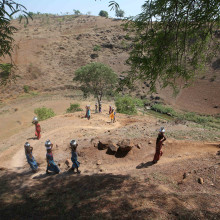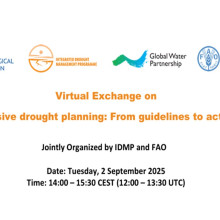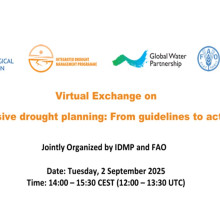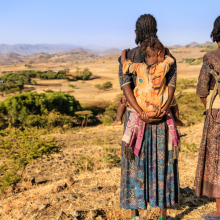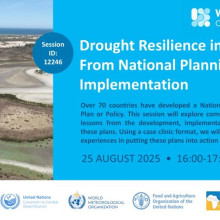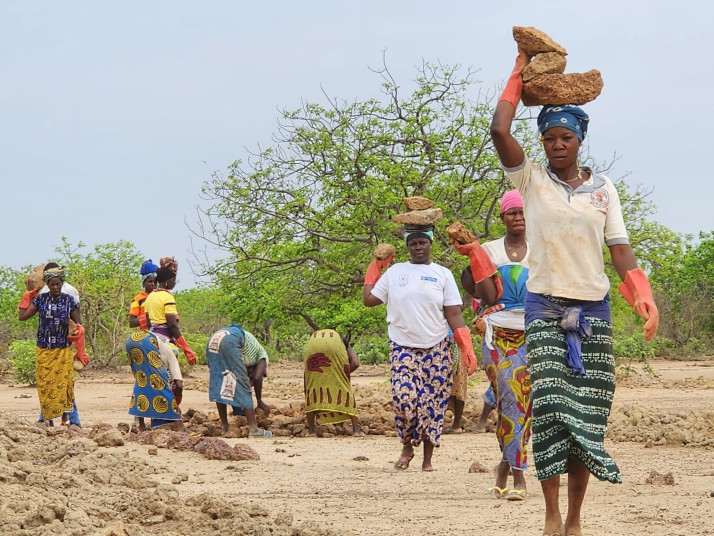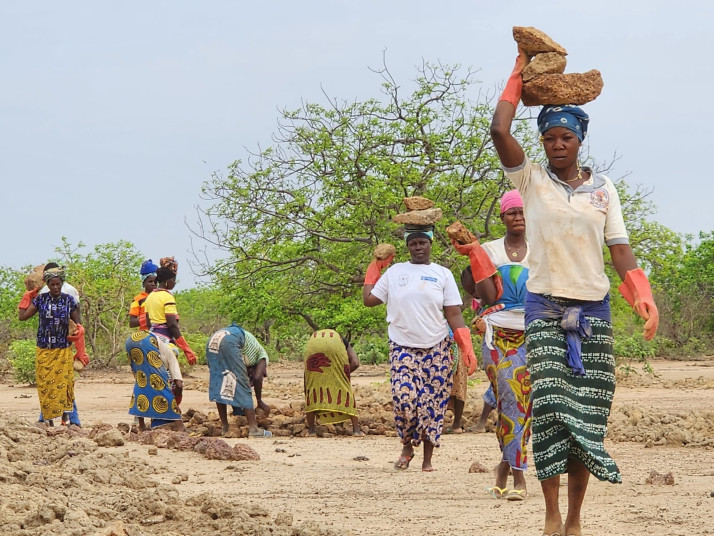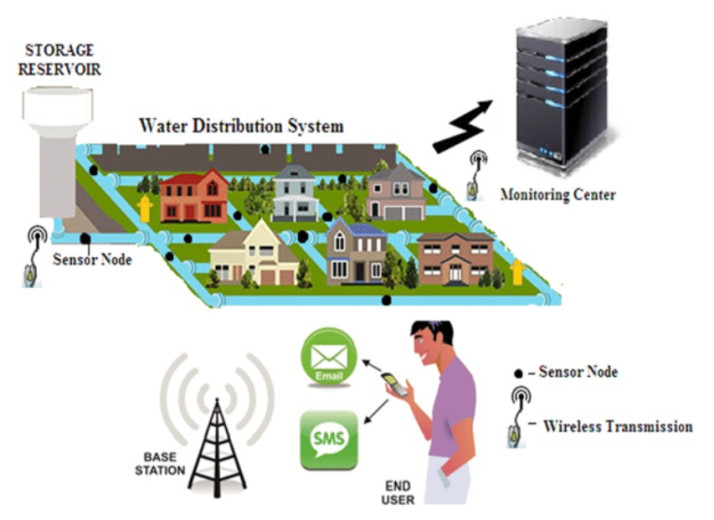UNCCD CRIC 23: Side and special events
See this link to the official site: https://www.unccd.int/cric23/side-events
-
Beatrice Giovinazzo created an event in Integrated Drought Management Programme
-
Saida Rivero created an event in Global Community
-
Saida Rivero created an event in Latin America and the Caribbean Community
-
Sabina Bokal created new community content in Integrated Drought Management Programme
-
Saida Rivero created an event in Global Community
-
Suyu Liu posted in Northern Mediterranean Community
há 2 months atrás Público -
Dieudonne ILBOUDO posted in Global Community
há 2 months atrás Público𝑾𝒐𝒎𝒆𝒏, 𝑲𝒆𝒚 𝑨𝒍𝒍𝒊𝒆𝒔 𝒊𝒏 𝒕𝒉𝒆 𝑭𝒊𝒈𝒉𝒕 𝑨𝒈𝒂𝒊𝒏𝒔𝒕 𝑫𝒆𝒔𝒆𝒓𝒕𝒊𝒇𝒊𝒄𝒂𝒕𝒊𝒐𝒏 𝒊𝒏 𝑨𝒇𝒓𝒊𝒄𝒂
Desertification affects a large part of Africa and threatens food security, water resources, and the livelihoods of millions of people. Yet, at the heart of this struggle, one essential actor stands out : women.
𝑮𝒖𝒂𝒓𝒅𝒊𝒂𝒏𝒔 𝒐𝒇 𝒕𝒉𝒆 𝒍𝒂𝒏𝒅
In Africa, women produce up to 70% of local food. They cultivate, fetch water, preserve seeds, and know the soil better than anyone. This close relationship with nature places them on the front lines against the effects of drought and land degradation.𝑪𝒐𝒏𝒄𝒓𝒆𝒕𝒆 𝒔𝒐𝒍𝒖𝒕𝒊𝒐𝒏𝒔
Across the continent, women-led initiatives are transforming the fight against desertification:
• tree planting and agroforestry,
• farming techniques that retain water and restore soils,
• transforming invasive plants into organic compost, biochar, and biogas,
• turning local plants into income sources (honey, moringa, soap).
These actions revive the land and ensure the food security of communities.𝑶𝒃𝒔𝒕𝒂𝒄𝒍𝒆𝒔 𝒕𝒐 𝒐𝒗𝒆𝒓𝒄𝒐𝒎𝒆
Despite their central role, women rarely own the land they cultivate (less than 20% in sub-Saharan Africa). They also have less access to finance and training.𝑾𝒉𝒚 𝒊𝒏𝒗𝒆𝒔𝒕 𝒊𝒏 𝒘𝒐𝒎𝒆𝒏?
Studies show that giving women the same land rights and resources as men could reduce global hunger by 12 to 17% (FAO and Action Against Hunger). This demonstrates how crucial their involvement is for a sustainable future.In conclusion, women are pillars of resilience in the fight against desertification. By granting them more resources, rights, and recognition, we not only strengthen the battle against land degradation but also promote social justice and safeguard the future of generations to come.
-
Dieudonne ILBOUDO posted in Africa Community
há 2 months atrás Público𝑾𝒐𝒎𝒆𝒏, 𝑲𝒆𝒚 𝑨𝒍𝒍𝒊𝒆𝒔 𝒊𝒏 𝒕𝒉𝒆 𝑭𝒊𝒈𝒉𝒕 𝑨𝒈𝒂𝒊𝒏𝒔𝒕 𝑫𝒆𝒔𝒆𝒓𝒕𝒊𝒇𝒊𝒄𝒂𝒕𝒊𝒐𝒏 𝒊𝒏 𝑨𝒇𝒓𝒊𝒄𝒂
Desertification affects a large part of Africa and threatens food security, water resources, and the livelihoods of millions of people. Yet, at the heart of this struggle, one essential actor stands out : women.
𝑮𝒖𝒂𝒓𝒅𝒊𝒂𝒏𝒔 𝒐𝒇 𝒕𝒉𝒆 𝒍𝒂𝒏𝒅
In Africa, women produce up to 70% of local food. They cultivate, fetch water, preserve seeds, and know the soil better than anyone. This close relationship with nature places them on the front lines against the effects of drought and land degradation.𝑪𝒐𝒏𝒄𝒓𝒆𝒕𝒆 𝒔𝒐𝒍𝒖𝒕𝒊𝒐𝒏𝒔
Across the continent, women-led initiatives are transforming the fight against desertification:
• tree planting and agroforestry,
• farming techniques that retain water and restore soils,
• transforming invasive plants into organic compost, biochar, and biogas,
• turning local plants into income sources (honey, moringa, soap).
These actions revive the land and ensure the food security of communities.𝑶𝒃𝒔𝒕𝒂𝒄𝒍𝒆𝒔 𝒕𝒐 𝒐𝒗𝒆𝒓𝒄𝒐𝒎𝒆
Despite their central role, women rarely own the land they cultivate (less than 20% in sub-Saharan Africa). They also have less access to finance and training.𝑾𝒉𝒚 𝒊𝒏𝒗𝒆𝒔𝒕 𝒊𝒏 𝒘𝒐𝒎𝒆𝒏?
Studies show that giving women the same land rights and resources as men could reduce global hunger by 12 to 17% (FAO and Action Against Hunger). This demonstrates how crucial their involvement is for a sustainable future.In conclusion, women are pillars of resilience in the fight against desertification. By granting them more resources, rights, and recognition, we not only strengthen the battle against land degradation but also promote social justice and safeguard the future of generations to come.
-
Laurent-Charles Tremblay-Levesque created an event in WEFE4MED Knowledge Hub
-
Saida Rivero created new community content in Global Community
-
Saida Rivero created new community content in Latin America and the Caribbean Community
-
Sara Riade created new community content in Latin America and the Caribbean Community
-
Sara Riade created new community content in Asia Community
-
Sara Riade created new community content in Central and Eastern Europe Community
-
Sara Riade created new community content in Northern Mediterranean Community
-
Sara Riade created new community content in Africa Community
-
Laith Ali Naji posted in Global Community
há 2 months atrás PúblicoHow Smart Tech Is Helping Catch Precious Water That’s Flowing Away
Imagine a huge pipe network under your city, carrying water to people’s homes. Now picture one-third of that water (enough to fill thousands of swimming pools) just vanishing into leaks, theft, or bad bills every year. Fixing leaks with traditional methods can feel like searching for a needle in a haystack. It’s costly, slow, and often misses hidden issues. Even worse, analyzing data by hand is error-prone and overly complex for many teams to manage (UNDP).
📖 You can read more and join the discussion in the Community at the UNCCD CLP platform:
👉 https://lnkd.in/egPbpgBFHere’s where smart, data-powered tools come in (think of them as super-sleuth gadgets for water systems). Two technologies team up to make this happen:
1. Internet of Things (IoT), which is like putting tiny, connected sensors (smart meters) across the water pipes, watching how much flows and how fast, around the clock.
2. Artificial Intelligence (AI) that is like teaching a computer to spot unusual patterns—such as pressure dropping in the middle of the night or flow spiking in one spot.Together, these tools turn data into clues. They help water teams find trouble spots quickly and accurately (without sending field crews everywhere).
UNDP’s Accelerator Lab worked with the startup FlowLess to test this smart system, so it was much cheaper than expensive foreign alternatives and adapted to different local water networks and needs, and the team remained open to feedback and improvements.
📖 You can read more and join the discussion in the Community at the UNCCD CLP platform:
👉 https://lnkd.in/egPbpgBF
Read more:
👉https://lnkd.in/e3h_E-gh
👉https://lnkd.in/eYcKxv4P). -
Laith Ali Naji posted in Asia Community
há 2 months atrás PúblicoHow Smart Tech Is Helping Catch Precious Water That’s Flowing Away
Imagine a huge pipe network under your city, carrying water to people’s homes. Now picture one-third of that water (enough to fill thousands of swimming pools) just vanishing into leaks, theft, or bad bills every year. Fixing leaks with traditional methods can feel like searching for a needle in a haystack. It’s costly, slow, and often misses hidden issues. Even worse, analyzing data by hand is error-prone and overly complex for many teams to manage (UNDP).
📖 You can read more and join the discussion in the Community at the UNCCD CLP platform:
👉 https://lnkd.in/egPbpgBFHere’s where smart, data-powered tools come in (think of them as super-sleuth gadgets for water systems). Two technologies team up to make this happen:
1. Internet of Things (IoT), which is like putting tiny, connected sensors (smart meters) across the water pipes, watching how much flows and how fast, around the clock.
2. Artificial Intelligence (AI) that is like teaching a computer to spot unusual patterns—such as pressure dropping in the middle of the night or flow spiking in one spot.Together, these tools turn data into clues. They help water teams find trouble spots quickly and accurately (without sending field crews everywhere).
UNDP’s Accelerator Lab worked with the startup FlowLess to test this smart system, so it was much cheaper than expensive foreign alternatives and adapted to different local water networks and needs, and the team remained open to feedback and improvements.
📖 You can read more and join the discussion in the Community at the UNCCD CLP platform:
👉 https://lnkd.in/egPbpgBF
Read more:
👉https://lnkd.in/e3h_E-gh
👉https://lnkd.in/eYcKxv4P). -
Laith Ali Naji posted in Asia Community
há 2 months atrás PúblicoIn the face of growing drought across West Asia, Saudi Arabia emerges as a success story
📖 You can read more and join the discussion in the Community at the UNCCD CLP platform:
👉 https://lnkd.in/egPbpgBFAccording to UN-Water, Saudi Arabia is rapidly accelerating SDG-6 progress through a powerful mix of policy, partnerships, and innovation:
📊 97% of the population now has access to safely managed drinking water
📈 100% urban wastewater is collected, more than 60% of it is safely treated and reused
🔧 AI-driven leak detection helped reduce non-revenue water to 23%, down from previous levels near 30%
🌊 Through public-private partnerships, Saudi Arabia operates the world’s largest desalination capacity, producing over 9 million m³/day
Saudi Arabia proves that even in one of the world’s driest regions, water security is possible when Vision 2030, strong governance, private sector engagement, and smart technologies work together.
📖 You can read more and join the discussion in the Community at the UNCCD CLP platform:
👉 https://lnkd.in/egPbpgBF
📖 The link of UN-Water:
👉 https://lnkd.in/ekhiNbTK -
Laith Ali Naji posted in Asia Community
há 2 months atrás PúblicoHow to get portable water in rural areas
Imagine this…
You’re in a barren place. No electricity, no equipment, and no ready-to-drink water. What would you do to secure water with the few resources you have?
Here are some simple, practical ideas:1- Purifying salty or dirty water with a simple solar still
Find any glass or transparent plastic sheet and a box (preferably a wooden box). put the water inside, and place the sheet at a 30–45° angle on top of the box. The sun will evaporate the water, and it will condense on the sheet. The drops will slide down into a small channel and collect in a clean container.
This can produce around 5–10 liters of clean water per day, depending on the sheet size.Just remember to clean the sheet from dust and the box bottom from salt deposits.
📖 You can read more and join the discussion in the Community at the UNCCD CLP platform:
👉 https://lnkd.in/egPbpgBF2- Extracting water from the air
Dig a hole in the ground and place a metal or plastic pipe inside. Let air flow through it. Temperature differences between the ground and the air will cause water vapor to condense inside the pipe.
If you have a small fan powered by wind, you can attach it to increase airflow.3-Collecting dew and fog using a mesh
Set up a mesh (plastic) in an open area, especially in mountainous or coastal regions. At night, as temperatures drop, water vapor will condense on the mesh and drip into a container or small pipe below.4- Air well to condense moisture
If you have stones or bricks, arrange them into a small tower or stone chamber with gaps. At night, the stones cool down, and during the day, moist air passing through will condense on them, dripping water to the base.

